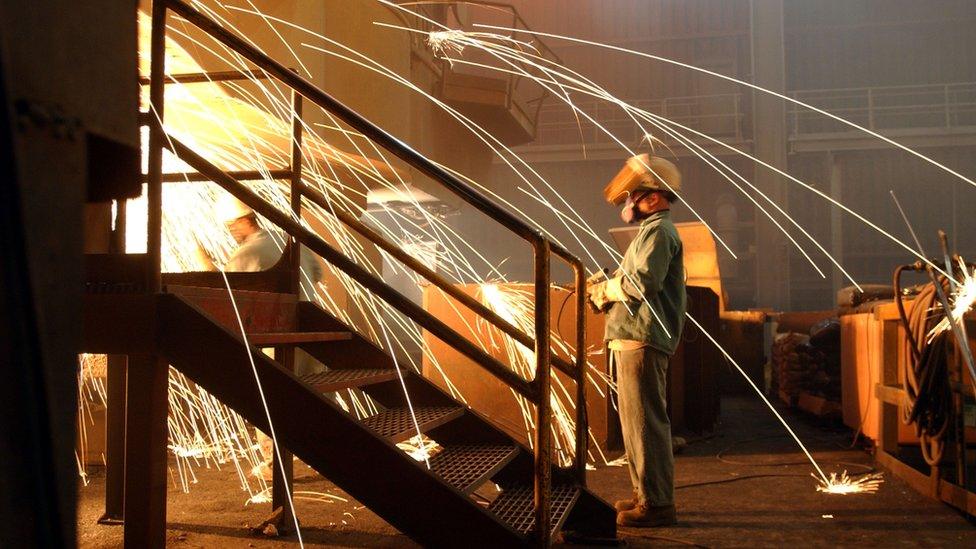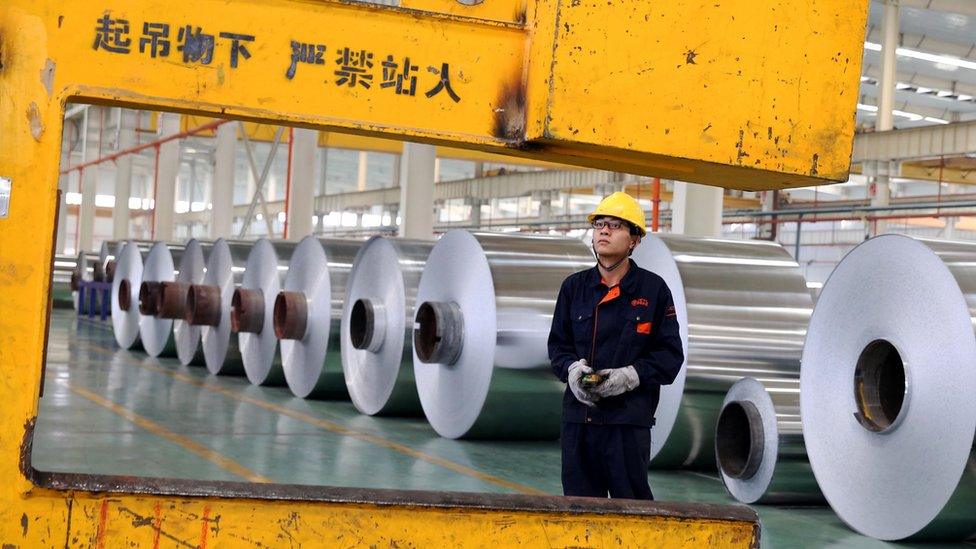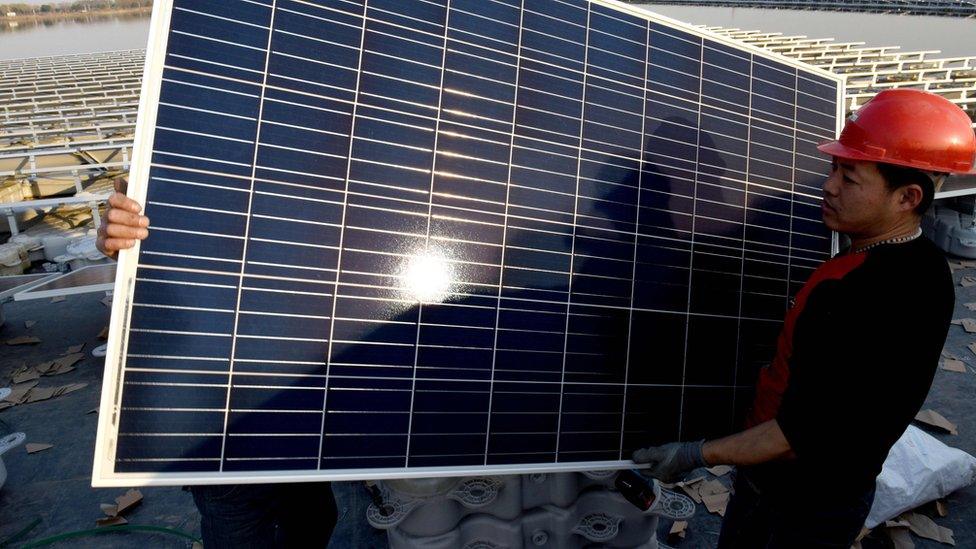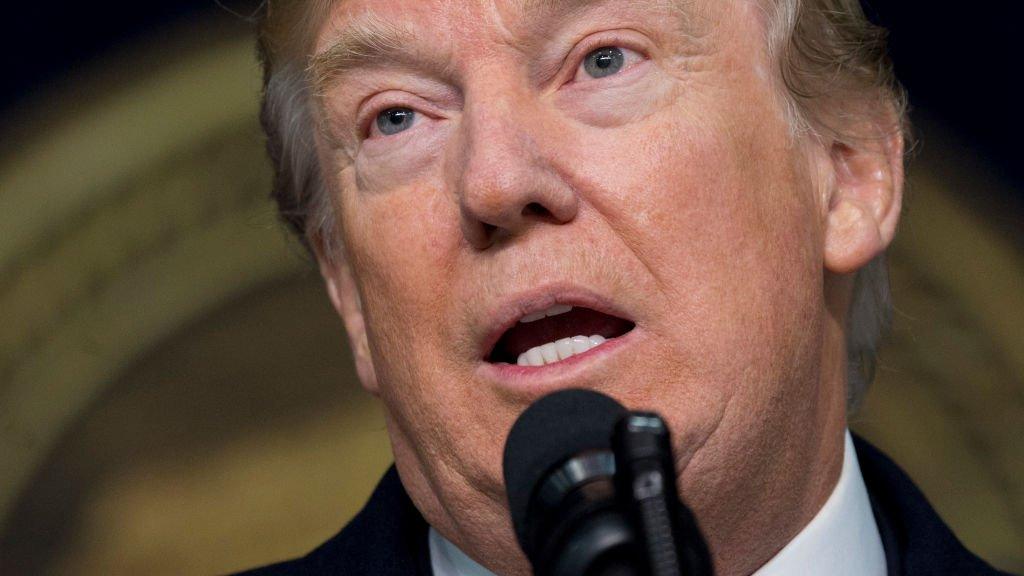US steel and aluminium imports face big tariffs, Trump says
- Published
Trump on new tariffs: 'We haven't been treated fairly'
President Donald Trump is to impose steep tariffs on steel and aluminium imports next week, hitting producers like Canada and China.
He said steel products face a 25% tariff, with 10% on aluminium goods.
The US imports four times more steel than it exports, and is reliant on steel from more than 100 nations.
Mr Trump tweeted that the US was suffering from "unfair trade". But the move has hit US markets, with the Dow Jones index closing down 1.7%.
The value of shares in American steel manufacturers jumped significantly after the announcement.
The news is likely to provoke an angry reaction from China, and analysts have expressed fears of the prospect of new trade wars.
Key US allies are also at risk of being hit with higher costs, but it is not clear if any countries will be excluded from the new measures.
Why now?
During his presidential campaign, Mr Trump said that foreign countries were "dumping vast amounts of steel all over the United States, which essentially is killing our steelworkers and steel companies".
And since taking office, Mr Trump said cheap imports from China were harming the viability of industry in the US, which is the world's biggest importer of steel.
China isn't the only country to export the material to the US - 110 countries and territories do so. And China is only the 11th biggest exporter to the US, external - some US allies, including Canada, Japan and South Korea are among the 10 biggest sources of steel for the US, and they all face a big bump in costs.
The recommendation to impose tariffs was made in a report, external by Secretary of Commerce Wilbur Ross. President Trump had asked him to investigate "whether steel imports threaten to impair the national security".
What did Trump have to say?
Mr Trump promised to rebuild the American steel and aluminium industries, which he said had suffered "disgraceful" treatment from other countries, in particular China, for decades.
"When our country can't make aluminium and steel...you almost don't have much of a country," he said.
"We need great steel makers, great aluminium makers for defence."

The number of people employed in the US steel industry fell by almost 50,000 between 2000 and 2016
He spoke as Chinese economic adviser Liu He, a friend of Chinese President Xi Jinping, visited the White House.
Mr Trump's announcement was slightly delayed amid reports of wrangling over the issue among his aides.
More than a dozen metals executives, including representatives from US Steel Corp and Arcelor Mittal, joined him as he made the announcement.
But officials from industries that rely on steel use have lobbied against the tariffs as they fear increased costs if they have to use more US-made metals.

Trade war in the White House
By Tara McKelvey, BBC White House reporter
The president wants to be seen as tough on trade and China, and so do many of his top officials: Pete Navarro, a trade adviser who's tipped for promotion, has hawkish views.
So does Harry Harris, the president's pick for ambassador to Australia. Still, some advisers thought the president should take it slow.
Aides huddled behind closed doors and in a hallway on Thursday morning, and the president's announcement was postponed.
The scheduling conflict reflected a bigger clash: a fight between hardliners and those who approach trade in a more cautious manner.
Meanwhile, the boss was right where he liked to be: in the eye of the storm, and everyone was waiting for him to speak.

What's the reaction?
Canada's Foreign Minister Chrystia Freedland said any tariffs would be "absolutely unacceptable"
The European Union "will react firmly and commensurately to defend our interests", European Commission President Jean-Claude Juncker said
China had already said it would consider retaliatory measures against the US
A spokesman for US Speaker of the House Paul Ryan said he hoped the president "will consider the unintended consequences of this idea and look at other approaches before moving forward"
What's the state of the US steel industry?
The US Department of Energy says the industry is recovering after a slump following the 2008 financial crisis.
But it is an industry significantly weaker than it was at the turn of the millennium. In the year 2000, the US produced 112m tons of steel - a figure that had fallen to 86.5m tons in 2016.
In 2000, 135,000 people were employed in the industry - a figure that fell to 83,600 in 2016.

What happens now?
Analysis by Natalie Sherman, BBC News business reporter, New York
The threat of tariffs on steel and aluminium has hovered around the Trump administration for months, with delays making the president vulnerable to criticism that he is all bark and no bite, despite his America First message.
He's now silenced those mutters and handed a victory to the steel industry.
But the chaos surrounding Thursday's announcement - in which advisers apparently hoped to dissuade the president from action - underscores just how many more losers there may be.
Dozens of companies in industries from car-making to construction had warned of hundreds of thousands of lost jobs, as higher prices raise costs for steel-dependent sectors such as manufacturing.
Defence Secretary Jim Mattis advised that the move would cost the US support among its allies, such as Canada and South Korea.
The European Union, Mexico and China have all said they are weighing retaliatory tariffs that would strike politically sensitive industries like agriculture.
The last time the US imposed steel tariffs, in 2002, President George W Bush lifted them less than two years later to avoid a damaging trade war.
Steel executives told the president on Thursday that they trust his judgement. But if a trade war is the outcome of this decision, as analysts expect, it remains to be seen how many will agree.
- Published28 February 2018

- Published24 January 2018
- Published23 January 2018

- Published11 January 2018
